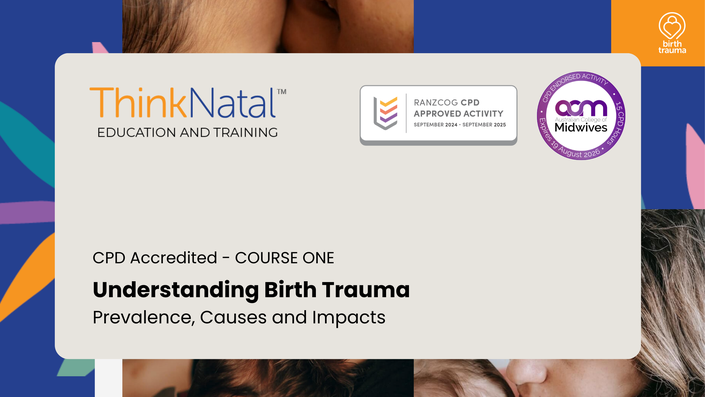Course Description
Join this course to learn how to support families after they may have experienced birth-related trauma. We keep it practical, focusing on broadening your understanding while helping you approach your work with a trauma-informed lens. Get ready to make a real difference.
Overview
This course is tailored to provide healthcare professionals and support providers with a comprehensive understanding of trauma within the context of postnatal care. Through a series of topics, participants will explore the interconnectedness of physical and psychological trauma, gain insights into perinatal suicidality, and learn debriefing techniques for trauma recovery.
Who is this course for?
Tailored for a diverse audience of professionals who work with families during the perinatal period, this course offers a rich learning experience for individuals at all levels of expertise.
CPD Accredited Course Detail
- 1 hour presentation (4 x lessons)
- 4 quiz based evaluations
- Additional Resources
CPD Program level requirement
This course also aligns closely with the ethical practice requirements for continuing professional development (CPD) by:
- Discussing the importance of informed consent and respecting the autonomy of individuals during childbirth.
- Promoting the ethical principles of non-maleficence (do no harm) and beneficence (act in the best interest of the patient).
Course Access
This course is available to access for 12 months post-purchase. As ThinkNatal is a learning community and the understanding of birth trauma and its effects grows, course content will be continually updated.
Learning outcomes
- Describe the interconnectedness of physical and psychological trauma, exploring how trauma manifests in both the body and mind.
- Examine the prevalence and risk factors associated with perinatal suicidality within the context of birth-related trauma.
- Discuss debriefing strategies and techniques aimed at supporting individuals and families affected by birth-related trauma, fostering healing and resilience.
- Discuss the unique challenges and considerations surrounding subsequent pregnancies and births after experiencing birth-related trauma, including strategies for empowerment and support.
- Identify the signs and impacts of vicarious trauma experienced by healthcare professionals working with individuals affected by birth-related trauma, and explore strategies for self-care.
About ThinkNatal Training and Education Hub
At ThinkNatal Training and Education Hub, we support health professionals, birth workers, and those working with families in the perinatal period. So whether you're a midwife, a doctor, a mental health clinician, a pelvic health physio, or you're working in community health, our modules are designed to support your learning and knowledge of birth related trauma.
Course Summary


